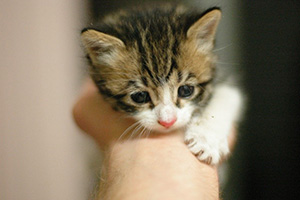17.2 Accusative Case of Adjectives (With Animate Nouns)

In this module, you will learn the accusative case endings of adjectives for all genders and for plural – when they are used with animate nouns. You will practice agreement between adjectives and animate nouns in the accusative case in direct object contexts and after prepositions followed by the accusative.
Завда́ння 1
Read the dialogues below and note that with animate nouns, the feminine and neuter accusative adjective forms are the same as those for inanimate nouns. The masculine adjective form, however, changes (see the underlined ending). To review the accusative forms of animate nouns, see Module 8.1.

– У тебе́ є се́стри або́ брати́?
– Так, я ма́ю ста́ршу сестру́ і моло́дшого бра́та.

– У вас є дома́шні твари́ни?
– Так, ми ма́ємо одне́ мале́ньке котеня́.
Combine the adjectives below with the most appropriate nouns from the bank to complete the list of people in thirty-year-old Nina’s immediate circle of family and friends. While some nouns might be logically combined with more than one adjective on the list, there is only one way to best match all the nouns and adjectives.
Завда́ння 2
Mark all masculine adjectives in the accusative case in the dialogues below. Then answer the questions that follow.
Завда́ння 3
Listen to the following statements and choose the person most likely to say it.
Transcript – Завдання 3
- Вони розмовляють про хворого сина.
- Вона зустріла іноземного студента в університеті.
- Вона думає про гарного хлопця.
- Він вітає старого дідуся з днем народження.
- Вона дуже любить молодшого брата.
- Вони дивляться фільм про синього кота.
Завда́ння 4
Read the captions below and note the accusative case endings for adjectives used with plural animate nouns. To review the accusative forms of plural animate nouns, see Module 8.1 .

Ми ма́ємо дале́ких ро́дичів в Австра́лії.

Виклада́чка зустрі́ла коли́шніх студе́нтів.
Then complete the dialogues below by selecting the best response to each question from the bank.
Завда́ння 5
Listen to the following unfinished questions and choose the most logical ending to each.
Transcript – Завдання 5
- Ти маєш молодших…?
- Що ти знаєш про його близьких…?
- Ти бачиш тих високих…?
- Як часто ми читаємо або чуємо в новинах про справжніх…?
- Ви маєте добрих…?
Завда́ння 6
Complete the dialogue between husband and wife using the most appropriate adjectives from the bank. Keep in mind that some of these adjectives are used as nouns; for more on such adjectives, see Module 16.2.
Мо́вний пазл
Look through the activities you have just completed and choose the correct statements below to summarize what you have learned.
А тепе́р тест!
Complete the conversation below by choosing the appropriate words from the bank. In some cases you may need to change the form to fit the grammatical context.
великий | старий | молодший | справжній | знайомий | близький | старший | новий

